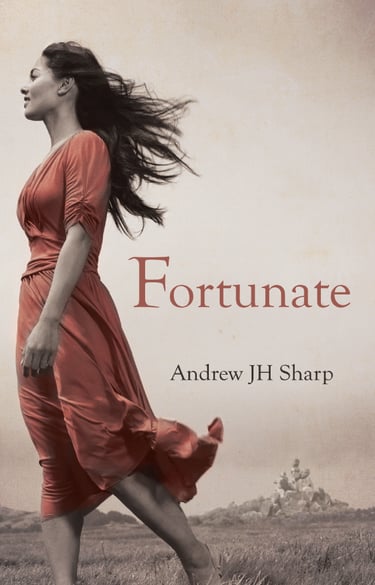

The Oxygen of Escape
Beth Jenkins, locum general practitioner, runs away from home at the age of twenty-eight and a half and becomes a heroine of a revolution.
Locked into a lonely future by a cruel twist of fate, Beth reaches breaking point, abandons her husband, and flees to faraway Zimbabwe. Her attempts to create a new life falter when she finds herself at the centre of a deadly struggle for the ownership of a farm. From a guest of honour at the President’s table to a disastrous decision that betrays a good man, her new start threatens to end in catastrophe.
But the land and its painted rocks hold clues to a path to atonement and re-found love if she has the courage to search.
This is your second novel, right?
Yes, my first, The Ghosts of Eden, is set in East Africa whilst Fortunate is set in Zimbabwe. I’m drawn to writing stories with an African setting. I don’t think there are enough of them.
Who will enjoy reading Fortunate?
You’re asking the author so I’m likely to make the hopeful claim that it will be a large proportion of the earth’s readers but my first novel won a Good Read award and I’ve tried to make Fortunate a ‘good read’ as well. So, I hope those that enjoy an absorbing read will enjoy Fortunate.
What shelf would I find this on in a bookshop?
Wherever booksellers place novels that combine political thriller with adventure with romance with a journey of self-discovery. I guess you could start at the ‘contemporary fiction’ shelf.
So why did you set it in Zimbabwe?
I wanted a place of exile for Beth where the politics forces ordinary people to have to make big decisions which might have life-changing implications for others and which might be risky to themselves. In such circumstances our assumptions are challenged and our character tested.
Besides that, Zimbabwe was a natural choice as I have worked there and visit regularly. The setting was also useful to one of the sub-themes of the novel: land. Who has the right to own it? What does it mean to us? For Beth, before she goes to Zimbabwe, not much. Her place in the UK means little more to her than a postcode but she’s about to enter a country where people consider land as their ‘spiritual nexus’ and will kill for it.
Why Fortunate?
Fortunate is a common first name in Zimbabwe and so I used it for one of my characters. Although he is not my main character, he is important to Beth Jenkins as her enigmatic helper.
Tell me a little more about who Fortunate is?
Fortunate Mukumbi is a male nurse from Zimbabwe working in a nursing home in the UK and is desperate to win the hand of the gorgeous but demanding Shungu. He will do anything to please her. But to do so, he needs the help of Beth, his doctor. Beth should not, perhaps, have got so involved with the personal life of one of her patients.
Who are your other main characters?
Mr De Villier is a cantankerous elderly Zimbabwean farmer who has been thrown off his land. He is convinced that only his doctor (Beth) can be trusted to deliver the title deed to his farm to his son, Selous, in Zimbabwe.
Selous is Mr De Villier’s estranged son, who Beth fantasises will be the sort of man (‘safari man’) that she can make a new life with but discovers, too late, that he has a reputation as a dangerous loner.
Boniface Madzwaya is a zealous Zimbabwean security services officer playing a clever game to get his hands on the title deed to Mr De Villier’s farm.
Lindiwe Dlamini is a Zimbabwean rock art researcher who holds a secret that Beth must uncover if she is going to find a way to a new future.
Is your novel different from others set in Zimbabwe?
There are several gripping fiction and non-fiction books set in Zimbabwe. Some are semi-autobiographical and deal with the painful political transition of the seventies to eighties although several black writers set their stories in modern Zimbabwe. Although I have set my story in 2007, a time of economic mayhem and political violence, the novel is not primarily about Zimbabwe’s politics. Others are more qualified than I am to write about that. Beth is an outsider - she could hardly place Zimbabwe on a map of Africa having never even crossed the Greenwich meridian, let alone the equator – and the novel is about the journey of the mind that she makes to re-find love. But Zimbabwe forms a dramatic backdrop to her story. I guess the novel is different in this respect: it’s a foreigner’s perspective on a country in convulsion.
You’ve mentioned the theme of the ownership of land. Are there any other themes?
A novel is multi-layered enough to encompass several themes. Another vein through Fortunate is that of the stories we invent about what has happened to us and why. At one extreme is Matt, Beth’s husband, who has had a brain haemorrhage which has disastrously altered his personality and vaporised his memory. He has an additional crucial disability: he is unable to form new memories and so he is locked in the present. He has no story to tell himself of who he is. He’s lost his sense of self. Beth, on the other hand, has a strong sense of the importance of story in everyone’s lives and prides herself on helping her patients reframe their narratives and see alternative possibilities. Her own story, however, she believes is as stuck as Matt’s. The novel explores her attempts to reinvent her own narrative – with unexpected results …
